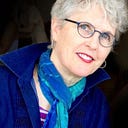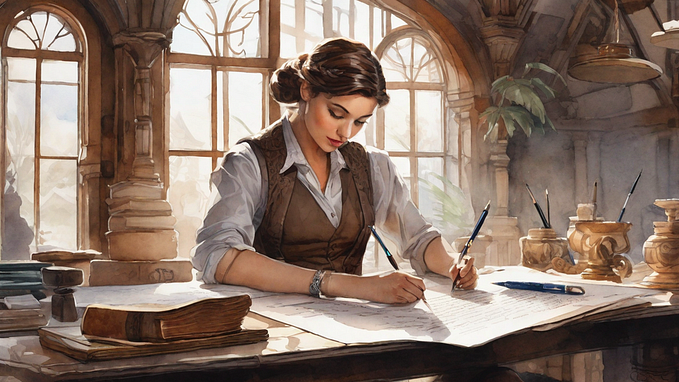We Meet on the Page: The Writer-Editor Relationship
Rejections. I had enough to wallpaper my makeshift writing studio. After five years as a lowly editorial assistant, toiling away in the upstairs-downstairs hierarchy of The New Yorker magazine, I was still unpublished; but I was young and had given myself ten years to become a writer. Every day in the magazine’s busy halls, great editors passed me by, their expressions pensive, distracted. I was as invisible as a servant. I longed to submit one of my stories to the revered fiction editor, Rachel MacKenzie. But her rejection would be like a premature death or a stillborn.
For twenty-five years MacKenzie worked with long-established, distinguished authors: John Hersey, who wrote Hiroshima, Isaac Bashevis Singer, Nobel Laureate and iconoclastic Jewish novelist, Phillip Roth, and Anne Tyler, a modern Jane Austen. Miss Mackenzie herself was a beautiful writer. Her novels flowed with what one critic called “serene lucidity.” The Wine of Astonishment is keenly perceptive, tender storytelling; her book, RISK, is the harrowing narrative of her open-heart surgery, a first of its kind. That book ends with the vivid line, “Dear God, the miracle.”
I believed it would be a miracle to ever receive a note in Miss MacKenzie’s delicate, precise handwriting: “Good to meet you in the margins” —that narrow, white space framing black text where editors scrawl and scribble, correct and chastise, rarely praise, always refine. The margins are a place where whole paragraphs sometimes rightly go to die. As Stephen King advises, “Kill your darlings.” If writers can’t, editors will.
It was only when I at last gave my notice at the magazine that I courageously submitted to Miss MacKenzie a short story, “Days Pass Away like Smoke.” I was about to pass away like an unseen wisp of a would-be writer from this bonfire of geniuses. At my going-away party, one call changed my life.
“Dear . . .” Miss MacKenzie’s voice was almost a whisper. She was frail of health and in the hospital. But I could hear her faint smile, see the curve of those distinctive black, raised eyebrows, oversized reading glasses, her silver bun swept up in an Edith Wharton European style. “You are a writer. I would very much like to edit this novel.”
For several years, we met in those sacred margins. I still have those faded pages with Miss MacKenzie’s cuts and editorial comments, many of which read like enduring rules for every writer.
Rachel’s Rules
“Don’t let your critic pick the bones until after your creator has feasted.”
“Be wary of ruinous distractions.”
“Revision is the soul of genius.”
“Remember, life and death also happen on the page.”
Rachel knew a lot about life and death. She was struggling with congestive heart failure. I always feared that I would lose her. We had precious five years together as editor and writer. I visited her often. Together, we celebrated the publication of my first novel, River of Light. I brought a perfectly ripe peach to her hospital room. She peeled it with a little knife as earnestly as if it were a paragraph she were paring line-by-line.
The last time I visited Rachel in her well-kempt New York apartment was three months before she died. Propped up on her sofa, she looked fragile but somehow feline, her eyes fierce with life, even as her body faded. “How’s the new book?” Rachel demanded.
She asked about the book as if it were our shared relative, a wayward child who must be coaxed, corralled, and called. A prodigal long awaited and welcomed home.
As I embraced Rachel to say goodbye, I murmured, “I will always write for you.” I was startled at the lightness of her bones; her spine, which was often in a back brace, shifted sideways under my hands. There was a faint perfume, flowery like lilac or roses. Her ever-present bifocals were perched on her silver head. She seemed bird-like, poised to take flight.
“Leave the door open as you go, my dear,” she said in the softest voice. “I want to listen to the sound of your footsteps . . .”
The night Rachel died, I was far away in the West on a ramshackle family farm, working on my second novel. In a dream, Rachel took her place alongside my desk with the unpretentious manner that was always her style.
“I’ve come to tell you that I’m in another place now,” Rachel said in her quiet, rather scholarly voice. “And I want you to know that even after death, there is still . . . suffering.” Rachel hesitated, adjusting her huge glasses. There was a familiar and fond bemusement in bright eyes. “But my dear . . . here you understand . . . everything.”
As writers, we try to understand everything; we listen to the footsteps of those characters who come to us asking us to tell their story. We long for an editorial guide to accompany us on the seemingly endless journey of writing a book. Finishing a book is like a small death and the only afterlife left us is to create another. I’ve been blessed to work with some of the finest editors in the business. Fo a writer this is like a happy childhood. These editorial allies also meet me in the margins or through comments inserted in track changes:
“Fuzzy thinking, fix this.”
“Beautiful writing, but you’ve lost the plot.”
“Oh, no, not this again! Delete.”
All these gifted editors sit on my shoulder as I write. Their editorial voices chide, guide, and cheer me on, like the late, legendary Judith Jones at Knopf, or my recent editor, Merloyd Lawrence. The guiding spirit of Rachel MacKenzie has accompanied me for decades, part-muse, part eternal critic. In my dreams, she tells me that after death, there is still much to edit and refine about our lives.I hear her advice while I teach my writing students and pass along Rachel’s Rules to them. I remind them—one simple call from an editor can change their lives.
Every day as I face the blank, blinking expanse of a computer screen, like an unknown new or next world, I glance over at Rachel’s last letter to me. Framed in a small silver frame, her note encourages me to keep listening, learning, and navigating the mysterious, sometimes bewildering world of the book. In her tiny, impeccable hand, she wrote her final edits:

Bio: This story was awarded an “Honorable Mention” in the recent Medium Writers’ Challenge contest. Brenda Peterson is a novelist and nature writer, author of over 20 books, including the New York Times “Notable Book of the Year” novel, Duck and Cover, just out in audiobook. Her memoir I Want to Be Left Behind was selected as a “Best Non-Fiction Book of the Year” by The Christian Science Monitor and chosen by independent booksellers as a “Great Read” and “Indie Next.” Her recent books include Wolf Nation, Wild Orca ,Your Life is a Book: How to Craft and Publish Your Memoir; and the new picture book with artist, Ed Young, Catastrophe by the Sea set on the Salish Sea. www.BrendaPetersonBooks.com






